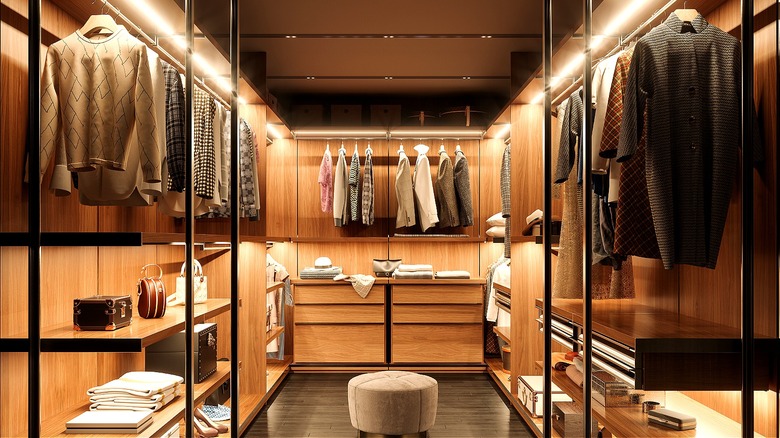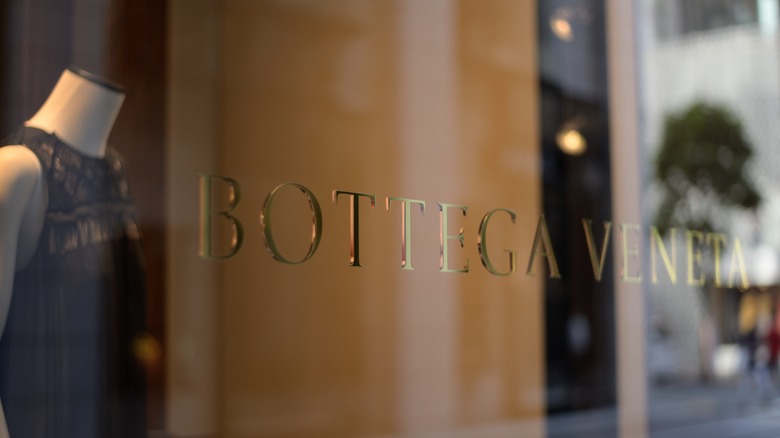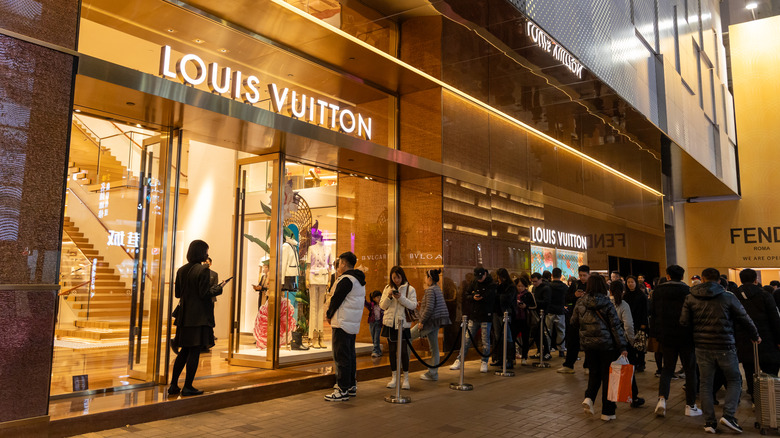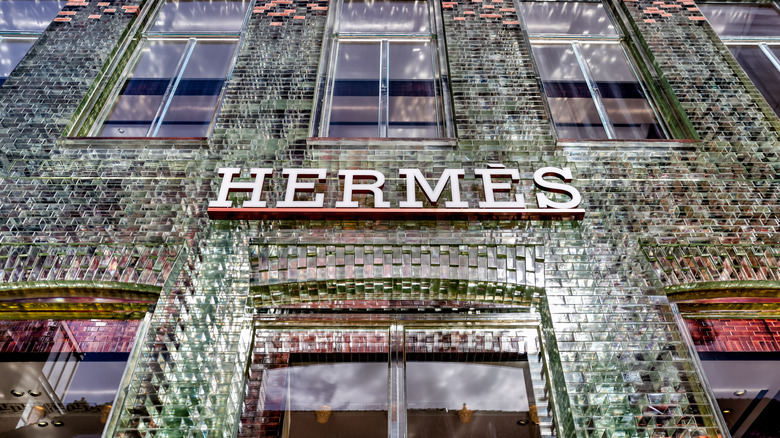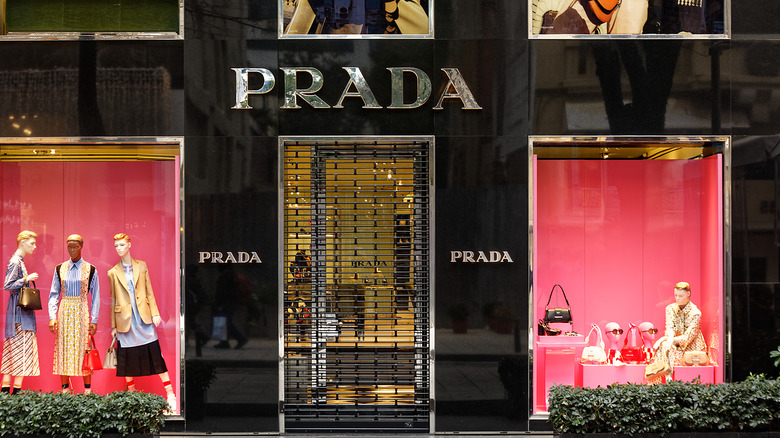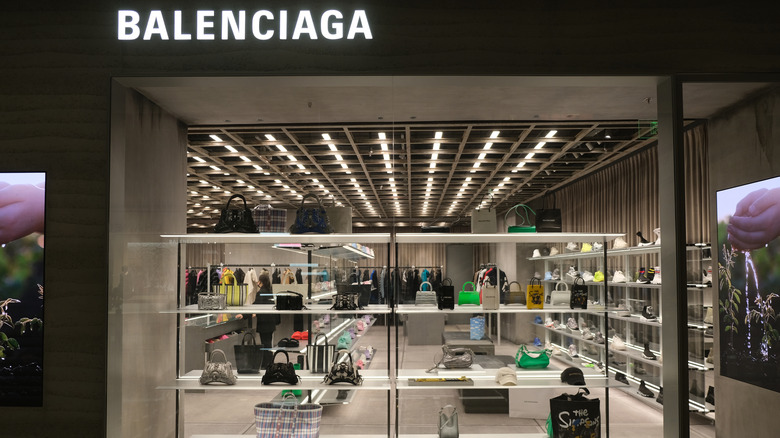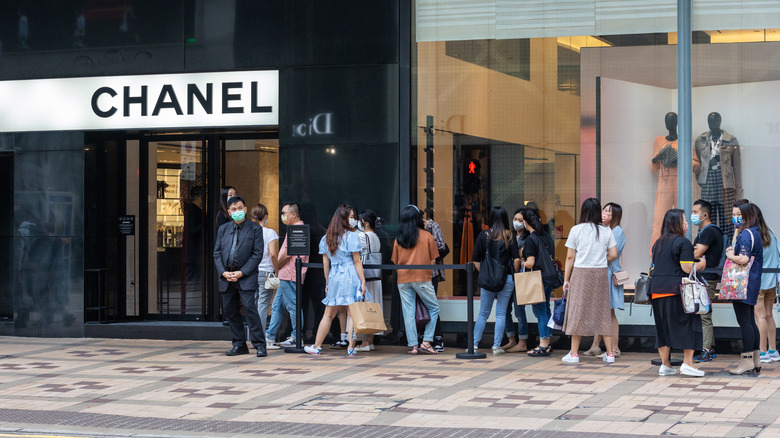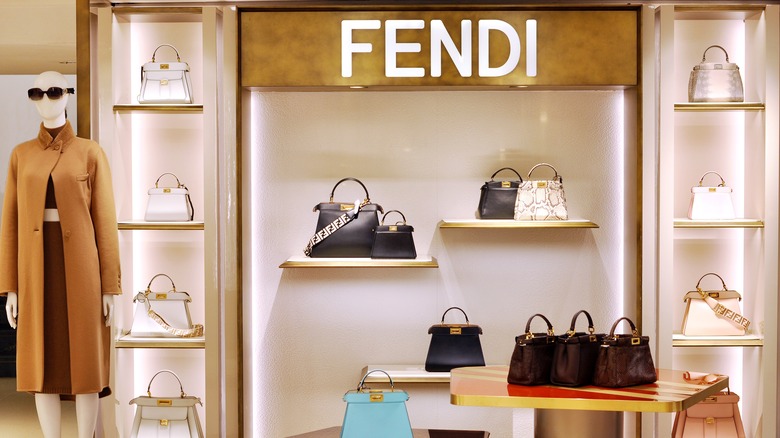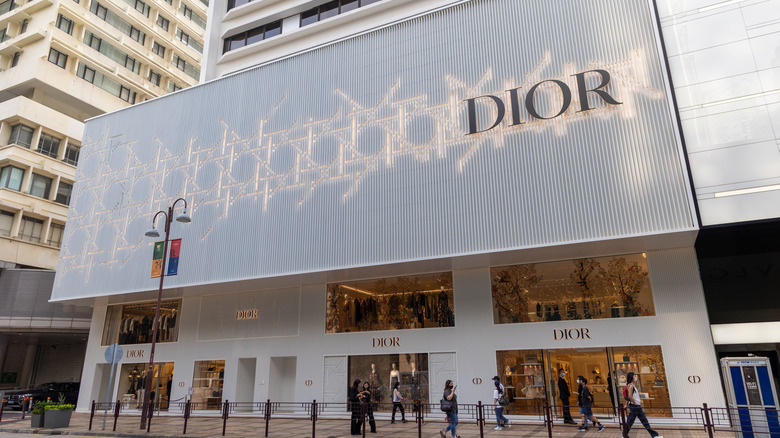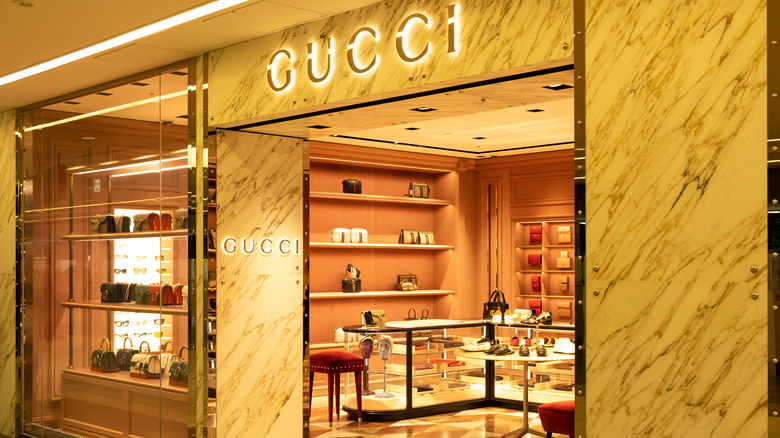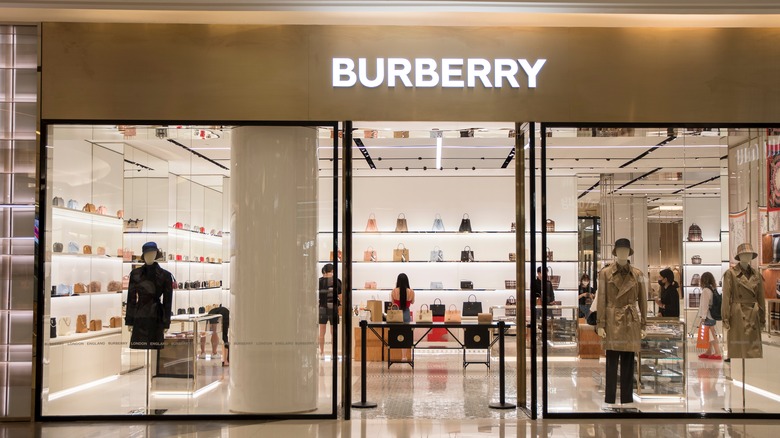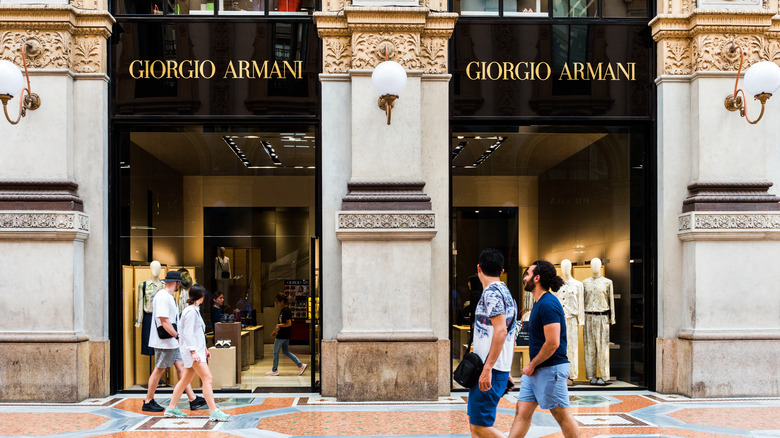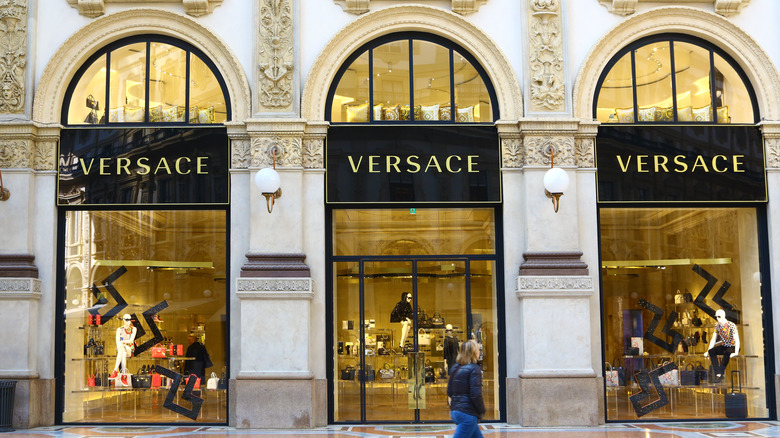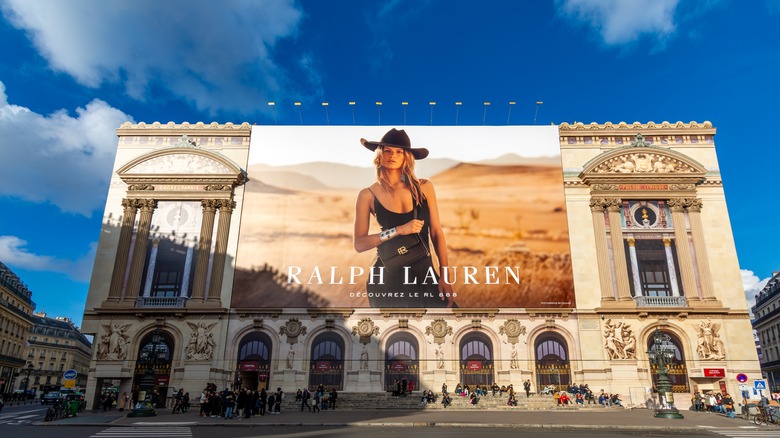13 Luxury Clothing Brands That Are Actually Worth Your Money
Luxury fashion is an industry not to be taken lightly. According to Statista, the 10 highest-valued luxury brands in the world individually made between $4 billion and $124 billion in 2023. Since economic stability and times of prosperity tend to raise sales of luxury goods, this much money being made during the financial uncertainty of 2023 indicates the segment's earning power.
Thanks to advancements in garment manufacturing in the late 1990s and early 2000s, it became cheaper and faster to mass-produce poorly constructed clothing that looked luxurious but would fall apart in your washing machine after a couple of washes. The trade-off for cheaper clothes was sweatshop labor and environmentally unsustainable materials ending up in landfills. If you've ever been curious about why companies like Shein are so cheap or why customers are so disappointed with their Temu orders, one major reason is poor quality. The grade of materials, the cost of production, and even how sustainable those materials are can influence cost. Manufacturing, duties and taxes related to shipping, and a desire to create an aspirational brand through exclusive or restrictive pricing also affect cost. So where luxury pricing is concerned, you want to spend money on brands that focus on all these factors. Remember, luxury may imply quality, but not all luxury brands are on the level of these brands.
1. Bottega Veneta
A few of the companies on this list fall under the umbrella company, The Kering Group. The company owns Gucci, Saint Laurent, Alexander McQueen, Bottega Veneta, and Balenciaga. It counted on a global workforce of 46,000 people to operate luxury brands within its $21 billion U.S. portfolio in 2023. Bottega Veneta contributed around $410 million of that by the third quarter of 2023, a 30% drop in wholesale revenue from previous years. Clothing and shoes paled in comparison to leather goods, making up a combined 20% of sales versus leather which made up 77% of its market. A quality pair of shoes that will last longer than a cheaply made pair is a win.
Bottega Veneta's understated luxury relies on comfortable basics like padded sandals and ready-to-wear clothing built to last thanks to sustainable materials like upcycled nylon. An online portal launched in 2021 — currently Salon 03 – makes this luxury brand easy to shop for online.
2. LVMH
Once known as the Louis Vuitton Don, the chameleon that is Kanye West obviously approves of the brand. If that doesn't sell you on the brand — because who isn't sold by a Kanye recommendation — maybe being the number one luxury brand worldwide might. Statista places the company's earnings at $124 billion in 2023, marking a record year of profits for LVMH (Louis Vuitton Moet Hennessy), based on sales of liquor brands Moet and Hennessy alongside designer apparel and accessories. Macrotrends gives LVMH a valuation of $421.37 billion, which helped make the owner, Bernard Arnault, the new richest man in the world with a net worth Bloomberg estimates to be around $218 billion.
The French company named after its founder focuses on timeless design and quality going back 167 years. The company controls 79 other brands, some of them, like Dior and Fendi, making this list. A big seller in the biggest luxury markets in the world — Japan, Korea, and China — it's also one of the most knocked-off luxury brands. It was once believed e-commerce would take some luster off luxury brands, however, LVMH proved naysayers wrong and was ahead of the curve by announcing access to 150 brands from its own portfolio and elsewhere online in 2017 and messaging with clients on WeChat. So while there are things you should never buy online, LVMH isn't one of them.
3. Hermes
While Hermes is a luxury brand known more for its high-end accessories like luxurious silk scarves and Birkin bags – the latter of which was inspired by actress and singer Jane Birkin, who was seated next to a Hermes executive on a flight from Paris to London — Hermes also makes quality clothing. The history of Hermes goes back to horse bridle manufacturing for wealthy Parisians in 1837 before switching to apparel for rich humans in 1918. A strictly French brand until 1924 when the company ventured outside of Europe, the fashion house's attention to detail, stitching, and quality material including leather is still sought after today.
While scarcity of products, like their famous Birkin bag, raises the resale value of these items tenfold, and the distinguished lineage of the brand is an invaluable form of word-of-mouth marketing, the company has no qualms about addressing fast fashion concerns and sustainability. Through a partnership with MycoWorks, Hermes experiments with more environmentally suitable alt-leathers made from mushrooms. Nobody seems to mind since, according to Statista, Hermes is the second most valuable fashion brand just behind LVMH with $76.22 billion in revenue in 2023.
4. Prada
Leather artisans show up again in the history of fashion house Prada. Founded in 1913 in Milan, Italy by namesake Mario Prada as a leather goods boutique, Prada's granddaughter Miuccia grew the humble brand into a fashion empire in the 1980s. Prada's retail model includes sales from its own luxury boutiques and secondary fashionable department stores and retailers. Aside from professional handling of design, the brand is another fashion powerhouse incorporating sustainable yet quality materials into luxury.
A recycled nylon product called Prada Re-Nylon was launched in 2019 through a partnership with Italian textile producer Aquafil. The regenerated nylon yarn is made from plastic and can be recycled an infinite number of times without losing any of its materiality or quality. For the climate-conscious, Prada's commitment to reducing its climate footprint through measures like this, as well as LED lighting in stores and a transition to solar energy, may be reason enough to include Prada in your holiday budgeting. Prada doesn't seem to have lost any business due to this eco-friendly perspective. Prada Group reported 2023 revenue of just over $5 billion.
5. Balenciaga
Cristóbal Balenciaga may never have envisioned that his couture clothing brand would be acquired by a megalith umbrella company like Kering Group, alongside other superstar fashion lines like Gucci or Bottega Veneta. After he died in 1972, the line went through a rough patch until the arrival of new blood in the form of creative director Demna Gvasalia in 2015. Gvasalia transformed the couture brand into a luxury streetwear brand, opening up the market to people who appreciate quality but also want to wear something comfortable instead of a piece of art.
Balenciaga excels at footwear like the speed sock, which retails for between $500 to $700, while at the same time integrating classic ballroom fits from the 1950s into women's wear. The line is a big hit with celebrities like Kim Kardashian and Justin Beiber, and as a result, it is a sought-after brand by fashionable young influencers. A $925 towel skirt caused a bit of an uproar in 2023 as part of Balenciaga's Spring 2024 collection when, understandably, consumers felt the pricing was absurd. Hey, luxury isn't cheap, and fans of the brand don't seem to mind. The company earnedaround $21 billion in 2023.
6. Chanel
Coco Chanel was the iconic designer of world famous Chanel, which combined elegance with comfort and created a classic perfume in the form of Chanel No. 5. You can thank Chanel for the little black dress phenomenon, which remains a go-to for fashionable women out on the town. The seamstress-turned-fashion-icon took Chanel from a tiny boutique in 1910 to a massive luxury brand. The Chanel tweed jacket, designed toward the end of WWII, is as popular as it was then and is considered worth its price tag due to its slim cut and impressive design. It takes an average of 130 hours to construct a single Chanel jacket with a combination of tweed, silk, and 100% alpaca wool. Perfect lining with multi-paneled pockets, specialized buttons, and trim account for the jackets which can cost thousands of dollars. The brand is among the most appealing to those seeking to try luxury clothing, and worth shopping even for those with a closet of high-end goods.
7. Fendi
Fendi is another popular brand that fell under the umbrella ownership of both Prada and LVMH after a $545 million joint acquisition in 1999 kept their mutual enemy, Gucci, from buying the brand first. While the enemy of an enemy is a friend, at some point, LVMH must have become everybody's enemy after buying up the rest of Prada's ownership in Fendi in 2002 for a cool $265 million. Expensive at the time, the buyout paid off in spades as evidenced by Fendi's $45 billion U.S. revenue in 2023 — a number that makes up half of LVMH Group's staggering revenue. Fendi generates that income from several avenues including liquor, jewelry, accessories, scents, leather goods, and retail.
Fendi is known worldwide for its exquisite leather handbags, expertly made by leather artisans, and finely made faux fur that loses nothing in terms of aesthetics or function but is cruelty-free and packaged in a biodegradable fashion. If you're in the market for fine faux furs and an accompanying leather handbag — sort of conflicting for the cows, but still — Fendi is a brand worth your money.
8. Dior
When Christian Dior launched the eponymous brand back in the 1940s, he quickly became a legend in the fashion industry for elegant women's wear, adored by the rich and famous. The company's public brand activations, like the Christian Dior: Designer of Dreams exhibition in New York City and the New Look Revolution in London, help raise brand awareness and allow fashionistas and lovers of classic, well-tailored design to interact directly with the company. Dior's social media campaigns on Instagram and WeChat are powerful examples of how to make the most of any platform. The brand's social media acumen has earned the company 46.1 million followers on Instagram, while a WeChat hashtag challenge garnered Dior 1 billion views.
Dior made $22.2 billion in revenue in the first quarter of 2024 after earning $92.7 billion in revenue for all of 2023, netting $17.1 billion in profit. The brand's future looks to be as high-quality as its clothing.
9. Gucci
The quality of Gucci's designs can't be denied and goes back to the founder, Guccio Gucci, who launched his custom luggage and horse bridle boutique in Florence, Italy, in 1921, and made a name for himself with the European jet set. When the dictator Mussolini came into power, his invasion of Ethiopia caused the League of Nations to embargo international trade with Italy. Gucci expanded from luggage to shoes, belts, and wallets. Over the years, the brand has incorporated leather, hemp, and even bamboo into its designs. Gucci ventured into clothing in the 1960s, with disastrous results. However, under the leadership of creative director Tom Ford in the 1990s, the brand became as known for its sexy marketing campaigns as its clothing, elevating its status among the stylish and bankrolled.
According to Statista, Gucci takes the fourth place spot behind Chanel for most highly valued luxury clothing brand after earning $26.3 billion in revenue in 2023. While that's impressive, Gucci's drag on the rest of the LVMH financial profile in the first quarter of 2024 isn't. The company posted a 21% drop in revenue, the equivalent of $2.2 billion, in the first quarter, impacted mainly by Asia-Pacific regional sales decline. As the largest overall purchaser of luxury goods, the region accounts for over one-third of the LVMH luxury brand profile, which makes Gucci's financial fall from grace that much more concerning.
10. Burberry
You may not think of war when you think of luxury fashion, but Burberry has made quite a splash with stylish trench coats inspired by jackets worn by military officers in WWI. Light, gabardine material can be credited to the founder, Thomas Burberry, the inventor of the fabric that makes his jackets luxury brands. Quality is top of mind for the brand so you can wear their garments for years. Even when your jacket eventually succumbs to wear and tear or the elements, there's the added protection of repair and reproofing services provided by Burberry. This service extends beyond just jackets. Cashmere, leather, canvas bags, and even sneakers are eligible for a refresh courtesy of Burberry, as long as you purchased the items from them or a registered vendor. They'll keep your trench waterproof and the rest of your outfit looking like they just came off the rack.
Burberry earned $3.3 billion in 2023, with an almost even split between men's and women's wear — roughly $934.5 million for women's and $935 million for men's — accounting for 5% growth from the previous year. The British brand, a favorite of Brit celebs and models, hosted a party at The Met Gala this year, where supermodels rubbed shoulders with superstars and only helped raise the company's profile.
11. Armani
Armani, founded by Giorgio Armani in 1975, is a luxury brand that has earned its name with immaculate tailoring and prime fabrics sewn into suits, designer jeans, shirts, slacks, and footwear. Accessories like glasses, scarves, and gloves also feature its ever-growing portfolio of labels including Armani Exchange, Emporio Armani, Armani Collezioni, and Armani Jeans. Armani owns 623 stores around the globe. The brand's production facilities house research and development, manufacturing, and textile plants, where much of what's made is crafted by hand.
While Armani isn't the most valuable luxury brand in the world, its founder isn't doing too badly. His net worth of $11.5 billion might be bolstered considerably by a possible IPO or merger, which he has gone on public record to note he is mulling over in his old age. Bloomberg analysts Deborah Aitken and Andrea Ferdinando Leggieri place the value of a takeover of the brand as somewhere around $8.6 billion to $10.7 billion, which would effectively almost double Giorgio Armani's net worth overnight. If nothing else, the value attached to this luxury brand should imply whether it's worth spending your money on.
12. Versace
The Versace story is as dramatic as the luxury brand. Founded in 1978 by Gianni Versace, the Versace name has become synonymous with avant-garde styling with a hint of glamour, evidenced by high-end bondage wear, silver mesh dresses, and rockstar energy that turned runway shows into major spectacles. These details and a rich and famous fanbase that includes the likes of Elton John, Madonna, and Tupac Shakur, earned Versace the moniker "rock n roll designer" throughout the 1980s and 1990s. Tragedy struck when Gianni Versace was murdered by a serial killer, resulting in his sister Donatella stepping into the leadership position. Versace is still a favorite of celebrities like Jennifer Lopez and Lil Nas X, who wore Versace outfits to award shows. Most recently, Cillian Murphy of "Peaky Blinders" and "Oppenheimer" fame, and Anne Hathaway of "The Witches" and, ironically, "The Devil Wears Prada" have lent their faces to Versace campaigns.
Versace is another luxury brand taking sustainability to heart. The brand uses eco-friendly materials in clothing, including a 100% sustainable dress worn by model Gisele Bündchen at The Met Gala. The dress is made from organic silk and cotton with crystal embroidery sourced from recycled glass bottles. The metallic gold sheen of the dress was created by a combination of nickel, lead, and chemical-free dyes. With this sort of care applied to a single dress, this is a luxury brand that cares about quality.
13. Ralph Lauren
This list is capped with an American luxury brand launched by a Bronx, New York-born and bred icon. Ralph Lifshitz, known as Ralph Lauren, started out selling ties under the brand name Polo back in 1967. In 1972, the legendary Polo shirt went into circulation alongside preppy sportswear that propelled the newly minted Ralph Lauren into American public consciousness. Styling for films, houseware, and restaurants followed, and by 2008, the brand was outfitting the entire U.S. Olympic team. Even the Queen of England approved of Ralph Lauren, knighting the designer in 2018 — the only American to have the privilege. Ralph Lauren is such an American classic that newer celebs like Zendaya can wear the same dress that Cindy Crawford, a celebrity from a different era, wore. The dress made its first appearance on the runway in the Spring/Summer 1992 collection, meaning a 32-year-old dress can still impress.
According to Zacks Equity Research, the publically traded company outperformed many other luxury brands on the stock market, leaping ahead by 38% while the industry average contracted by 3.8%. The company has earned the attention of 1.7 million new customers, which Zacks chalks up to its labor force, digital innovation, forward-thinking policies around sustainability, and strong operations.
